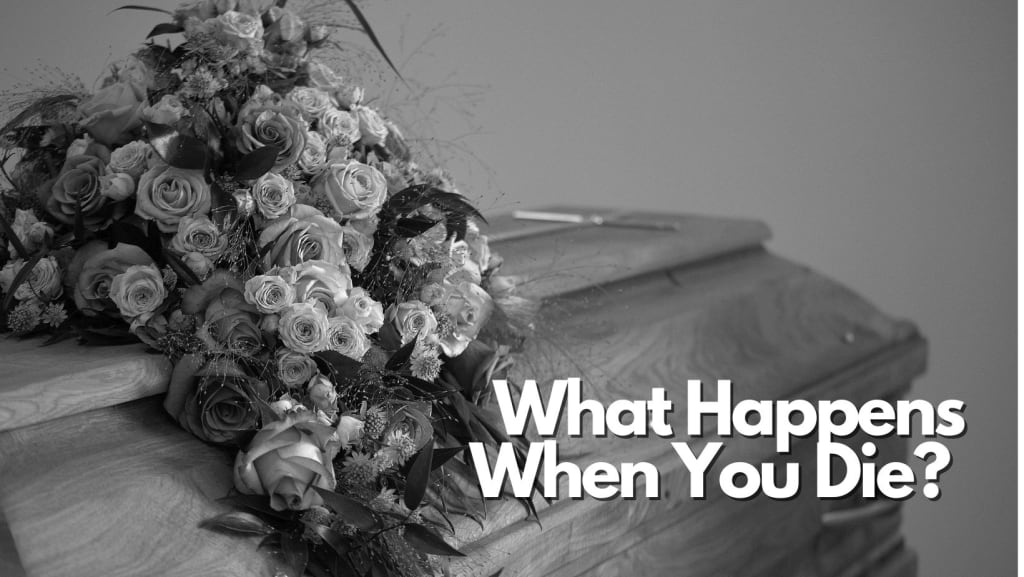What Happens When You Die?
What's next when our time here is up?

Have you ever pondered the mysteries that surround the end of life? Despite our heavy reliance on science in today's world, it's fascinating how many people still hold onto the notion of an existence beyond this one after death.Back in 2014, The Telegraph in the UK conducted a survey, revealing that nearly 60 percent of those polled expressed a belief in some form of continued existence after death.
In the United States, a predominantly Christian nation, Pew Research asked people about their views on the afterlife in 2015. The results were quite intriguing - a staggering 72 percent of Americans professed a belief in heaven, describing it as a place where virtuous souls are rewarded eternally. Additionally, 54 percent of U.S. adults believed in hell, envisioning it as a realm where unrepentant wrongdoers face eternal punishment.
It appears that many individuals believe that after death, we might find ourselves in a heavenly realm with fluffy clouds, or conversely, if we haven't adhered to the moral guidelines of our chosen religion, we might be confronted with eternal damnation and the prospect of facing a stern, pitchfork-wielding figure. However, let's start with a dose of empirical realism and consider what happens to the physical body upon death.
Physicians ascertain death when the heart ceases to beat, and there is no longer any electrical activity in the brain. Brain death is synonymous with death, although machines can sustain some bodily functions for a brief period. There's also the possibility of cardiac death, where the heart stops pumping blood. Interestingly, individuals who have experienced cardiac death but were revived have reported awareness of their surroundings or even moving towards a light during near-death experiences. However, this grace period only extends for about 4-6 minutes. Should one pass through the light, we enter the realm of biological death - the ultimate end, the final whistle, as dead as can be. Admittedly, this phase can be somewhat undignified, but then again, you're no longer among the living.
Once you've definitively departed this world, your muscles relax, including your sphincter, causing any remnants of your last meal to make an untimely exit – and any trapped gas might contribute to an unpleasant odor. The contents of your bladder may also empty, creating a rather messy affair. For men, there may even be involuntary ejaculation, while women, if pregnant, could experience "coffin birth," albeit infrequently. Instead of the traditional birthing process, gases in the abdomen assist in delivering the newborn. As the body discharges its trapped substances, air may escape through the mouth, sometimes producing sounds that resemble moans and groans. Muscle contractions might cause twitching, but they do not signify life; they are simply involuntary movements. In certain cases, men might even experience post-mortem erections if they die lying on their stomachs due to blood flow dynamics. Blood pooling, referred to as "livor mortis," gives parts of the body a dark purple hue. These are the initial events that occur shortly after one's demise.
Without the circulation of blood, the body starts to cool down, a phenomenon known as "algor mortis" or "death chill," until it reaches the ambient temperature. Rigor mortis sets in within approximately 2-6 hours as calcium enters the muscle cells. In the absence of blood flow, cells break down, promoting bacterial growth and the onset of decomposition. While it may appear as if your hair and nails are growing, they are actually not; it's the skin receding, creating an illusion of growth. The skin eventually loosens, and blisters may form. The subsequent stage is putrefaction, where bacteria and microorganisms begin their feast, and the body emits a putrid odor. Some have described the smell as unbearable. Gradually, everything that is soft turns into a liquefied state, while bones, cartilage, and hair remain intact. By the time you are laid to rest, you're well on your way to decomposition. If embalmed and buried, the process may be delayed, but if left above ground, you'll become a liquefied mess within a month, serving as nourishment for insects, maggots, plants, and animals. Underground, it might take 8-12 years for you to reduce to nothing but a skeleton. After around 50 years, even your bones will become part of the Earth. It's important to note that the rate of decomposition depends on numerous factors too numerous to detail here, but the overall picture is clear.
While some individuals report vivid near-death experiences, others describe it as a void of black emptiness, devoid of thoughts or consciousness. Philosophers like René Descartes believed in the separation of the soul from the body, as many religions also suggest, hinting that something endures after death. Friedrich Nietzsche explored the concept of eternal recurrence, suggesting that existence and energy in the universe infinitely repeat. One relives the same life over and over for all eternity, serving as a compelling incentive to lead a virtuous life. This notion finds parallels in Buddhism's "Wheel of Samsara," where all souls and lives enter a cycle again after death, though not necessarily the same life. This concept, known as reincarnation, is sometimes associated with the sensation of déjà vu. Buddhists believe that true enlightenment can break this cycle, leading to nirvana.
So, do we ascend to heaven after our earthly bodies cease to function, hoping to gain entry through the pearly gates while reminiscing about that stolen candy bar from a school trip to Niagara Falls? Are we welcomed into a paradise filled with delectable foods and enchanting companions? Or do we merely return to the Earth, our souls a fleeting fancy that briefly distracts us from our cosmic insignificance and the occasional sense of futility experienced during our time on this planet? These are questions we cannot definitively answer, but we are eager to hear your thoughts. Please share your reflections in the comments, and, most importantly, stay among the living!
About the Creator
Glowly Journey
Let's learn the enlightening knowledge together. There is so much to discover on this journey of life. Now, grab your coffee and take a moment for me time, and let's dive into!
Join the path for a brighter you🫶🏻
Be good do good🌺






Comments
There are no comments for this story
Be the first to respond and start the conversation.